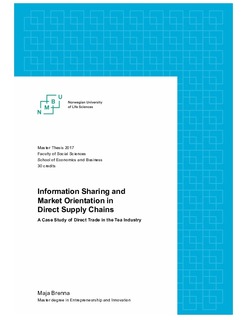| dc.contributor.advisor | Kubberød, Elin | |
| dc.contributor.author | Brenna, Maja | |
| dc.date.accessioned | 2017-09-07T12:02:45Z | |
| dc.date.available | 2017-09-07T12:02:45Z | |
| dc.date.issued | 2017 | |
| dc.identifier.uri | http://hdl.handle.net/11250/2453579 | |
| dc.description.abstract | The aim of this study has been to increase the understanding of relationships in direct supply chains and how closer relationships between links might lead to increased flow of information. The study does so by exploring the phenomenon of direct trade in the specialty tea industry. It explores how increased information flow influences the degree of market orientation in the supply chain as a whole and for the individual links. The results of this investigation are employed to answer the following problem statement: In what way does direct trade create a beneficial relationship for information sharing and how does information sharing influence the market orientation of companies engaging in direct trade?
By employing the literature on supply chain learning and supply chain orientation, this study sheds light on the importance of information flow and describes the relational aspects that characterise close relationships between producers and distributors within the specialty tea sector. Literature on market orientation is employed to explore how the information shared between upstream and downstream actors is utilised.
The study was designed as an explorative multiple case study, and four in-depth interviews with two different producers and two different distributors who engage in direct trade were conducted. The resulting data creates an image of the type of relationship that arises in a direct supply chain, what information is typically shared in these relationships, and how this information influences the subjects’ market orientation.
The empirical findings show that actors engaging in direct trade have strong supplier-distributor relationships with a high level of trust, and that they collaborate to ensure information flow. In particular, their efforts are focused on disseminating information that adds to the value of the product. The findings support notions in existing literature suggesting that producers’ market orientation can affect distributors’ market orientation, and that market oriented firms have strong relationships due to their high degree of information sharing. Furthermore, the findings suggest that all three components of market orientation, generation, dissemination and responsiveness of market information, may not be of equal importance for all links in a supply chain. | nb_NO |
| dc.description.abstract | Formålet med denne studien har vært å øke forståelsen av relasjoner i direkte verdikjeder og hvordan nære relasjoner mellom leddene i slike kjeder kan føre til økt informasjonsflyt. Fenomenet undersøkes gjennom direkte handel i te-industrien, nærmere bestemt i det segmentet som i bransjen kalles “specialty tea”. Videre utforsker studien hvordan økt informasjonsflyt kan påvirke leddenes markedsorientering, både individuelt og som verdikjede. Resultatene av disse undersøkelsene utgjør grunnlaget for å kunne besvare studiens problemstilling: På hvilke måter kan direkte handel skape en fordelaktig relasjon for informasjonsdeling og hvordan påvirker informasjonsdeling markedsorienteringen til firmaer som handler direkte?
Studien belyser viktigheten ved informasjonsflyt og beskriver de relasjonelle aspektene som karakteriserer nære forbindelser mellom produsenter og distributører i “specialty tea”- sektoren ved å benytte teori om “supply chain learning” og “supply chain orientation”. Videre er teori om markedsorientering benyttet for å utforske hvordan leddene i verdikjeden utnytter informasjonen de deler seg i mellom.
Gjennom et eksplorativt fler-case-studie har fire dybdeintervjuer blitt gjennomført med to forskjellige produsenter og to forskjellige distributører som alle praktiserer direkte handel. Dataen danner et bilde av hvilke relasjoner som oppstår i en direkte verdikjede, hva slags informasjon som deles mellom aktørene i slike relasjoner og hvordan denne informasjonen kan påvirke aktørenes markedsorientering.
De empiriske funnene viser at aktører som praktiserer direkte handel har tette relasjoner og tillit til sine partnere, og at de samarbeider om å sikre informasjonsflyt i verdikjeden. Aktørene fokuserer mest på å spre informasjon som tillegger produktet mer verdi. Funnene bekrefter tidligere forskning som har funnet at produsenters markedsorientering har en innvirkning på distributørers markedsorientering, og at markedsorienterte firmaer har tette relasjoner til sine partnere til dels grunnet deres hyppige informasjonsdeling. Videre viser funnene at markedsorienteringens tre komponenter, generering, spredning og respons til markedsdata, ikke nødvendigvis er av like stor viktighet for alle leddene i en verdikjede. | nb_NO |
| dc.language.iso | eng | nb_NO |
| dc.publisher | Norwegian University of Life Sciences, Ås | nb_NO |
| dc.rights | Attribution-NonCommercial-NoDerivatives 4.0 Internasjonal | * |
| dc.rights.uri | http://creativecommons.org/licenses/by-nc-nd/4.0/deed.no | * |
| dc.subject | Supply chain orientation | nb_NO |
| dc.title | Information sharing and market orientation in direct supply chains : a case study of direct trade in the tea industry | nb_NO |
| dc.type | Master thesis | nb_NO |
| dc.description.version | submittedVersion | nb_NO |
| dc.subject.nsi | VDP::Social science: 200 | nb_NO |
| dc.source.pagenumber | 100 | nb_NO |
| dc.description.localcode | M-EI | nb_NO |

